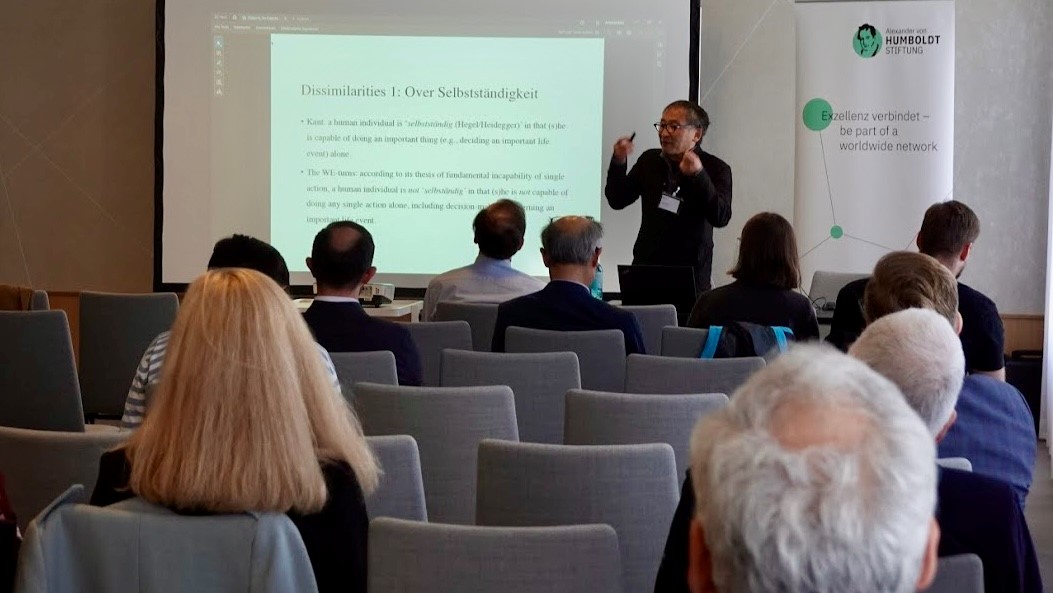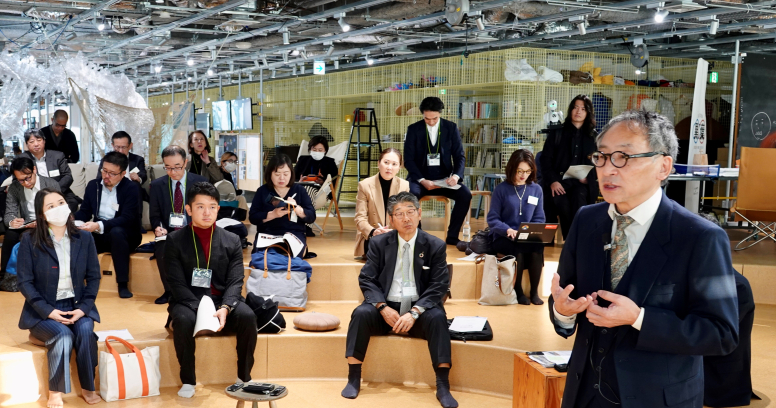Profs. Deguchi, Gabriel lecture in Germany as 300th anniversary of Kant’s birth observed

Professor Yasuo Deguchi, Co-Chairperson of the Kyoto Institute of Philosophy delivered an invited lecture at the Bonn Humboldt Award Winners' Forum in Germany. Professor Markus Gabriel gave an invited lecture at the International Kant Congress commemorating the 300th anniversary of Kant's birth, also held in Germany.
Details
Kyoto University Professor Yasuo Deguchi, Co-Chairperson of the Kyoto Institute of Philosophy delivered an invited lecture at the Bonn Humboldt Award Winners' Forum (held September 10th-13th) in Bonn, Germany. Prior to the forum, Professor Markus Gabriel of the University of Bonn, who serves as Senior Global Advisor to the Institute, gave an invited lecture at the 14th International Kant Congress (September 8th-13th), also held in Bonn.
Bonn Humboldt Award Winners' Forum is organized annually by the Alexander von Humboldt Foundation in Germany. The forum invites prominent researchers, including the Humboldt Research Award winners, from around the world. This year’s forum coincided with the 300th anniversary of the birth of German philosopher Immanuel Kant, and its theme was “Kantian philosophy from a global perspective and global problems from a Kantian perspective.”
Over four days, the forum featured approximately 30 lectures and engaged participants in dynamic discussions on topics such as the relationship between Kant and topics such as human rights, colonialism, and world religions.
On the third day of the forum (September 12th), Professor Deguchi presented his lecture, “Responses to Kant's Philosophy from an East Asian Perspective”. He explained how his own concept of the WE-turn draws inspiration from traditional East Asian thought and offers a distinct approach to concepts such as autonomy and freedom, in contrast to Kantian philosophy. However, both share a focus on the importance of “cultivation (“Bildung” in German)” —the intellectual and ethical perfection of an individual.
Professor Deguchi noted how this focus was pivotal in the early stages of the full-fledged acceptance of Kant in Japan in the early 20th century. Concluding his lecture, he characterized the WE-turn as an East Asian philosophy for the 21st century, while also recognizing it a response to Kant from East Asia in the 21st century, given the fact that he himself started his career as a Kant scholar.
The International Kant Congress, held every four years, is the largest global gathering dedicated to Kantian studies. It provides scholars worldwide with a platform to share their research and foster academic exchange. This year’s 14th Congress celebrated the 300th anniversary of Kant's birth with the theme of “Kant's Project of Enlightenment.”
The event featured over 150 theme-based sessions, lectures, and panel discussions, along with cultural events such as a concert lecture about Kant and Beethoven, his contemporary born in Bonn. Professor Gabriel and a researcher from the Kyoto Institute of Philosophy participated in the congress.
On the evening of September 10th, the third day of the congress, Professor Gabriel delivered a lecture titled “Kant and the New Enlightenment.” Referring to the situation of international politics, he starts his lecture with diagnosing today as being “times that hinder moral progress” and contrasting it with Kant’s era of the Enlightenment.
Highlighting issues such as increasing political polarization and the complexities of social and economic challenges amplified by the internet and generative AI, Professor Gabriel emphasized the need for “New Enlightenment.” This initiative, he explained, bridges theory and practice through international and cross-sectoral collaboration among industry, government, academia, and the arts. He argued that moral progress in this context evolves in a spiral rather than a linear fashion.
Drawing on Kant’s ideas, Professor Gabriel stressed the importance of realizing ethical recognition of the good in practice rather than confining progress to theoretical discussions, advocating for a project of the “New Enlightenment.”
Others



